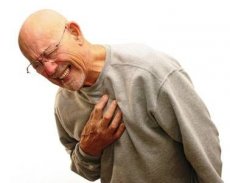The reason why a heart attack happens early in the morning
Last reviewed: 29.11.2021

All iLive content is medically reviewed or fact checked to ensure as much factual accuracy as possible.
We have strict sourcing guidelines and only link to reputable media sites, academic research institutions and, whenever possible, medically peer reviewed studies. Note that the numbers in parentheses ([1], [2], etc.) are clickable links to these studies.
If you feel that any of our content is inaccurate, out-of-date, or otherwise questionable, please select it and press Ctrl + Enter.

A heart attack, according to statistics, happens usually in the early morning, at about half past seven in the morning. As scientists have found out, this is due to the body's biological clock. Human blood contains protein, inhibiting the cleavage of blood clots and the peak of this value is just in the early morning, experts say. The research was conducted jointly by the staff of the University of Oregon and the Brigham Women's Hospital.
In the course of their research, scientists studied two weeks of protein concentration in the body of twelve healthy volunteers. In their study, scientists wanted to know what affects the level of protein in the human body: daytime activity or directly internal clock. Specialists were interested in the inhibitor of the plasminogen activator-1, a protein that cleaves thrombi. The level of this protein directly affects the development of a stroke or heart attack. As the author of the research project notes, the amount of protein in the blood increases in the morning, which is due to circadian rhythms of man (biological clock). At the same time, human behavior at this time of day or external factors do not matter. Specialists do not exclude that a person who has a higher probability of complications from the vascular and heart can not properly regulate the level of protein (plasminogen activator-1 inhibitor). In the risk group were people with excess weight, diabetes, with heart disease and blood vessels.
A heart attack is indicated by prolonged pain in the chest. As the statistics show, only 30% of people entering the hospital with chest pain are diagnosed with a heart attack. If the pain that occurs suddenly or gradually increasing, passes in five to seven minutes, then this can not be a heart attack. In one of the American hospitals, experts have identified a link between the duration of pain in the chest and a heart attack in a person. Markers of cardiac problems are certainly important in assessing the risk of heart attack, but they can not show a 100% result and help in determining the diagnosis. It is here that the duration of pain will help to more accurately identify the problem and provide timely assistance if necessary.
In this study, the researchers analyzed data from more than 400 patients. Approximately 40% of people had a heart attack, and on average the tenderness in the chest lasted 2 hours. The rest of the pain lasted about 40 minutes. Among patients who had chest pain for a short time (about 5-10 minutes), heart attacks were not diagnosed, and no deaths were recorded in such patients.
Also earlier, the scientists found that the signs of a heart attack in a man and a woman are significantly different. Almost half of women do not feel typical pain in the chest during a heart attack, therefore it is recommended that the female half of humanity take their health seriously. About 14% of women aged 55 years die from a heart attack because they were not provided with timely medical assistance.

